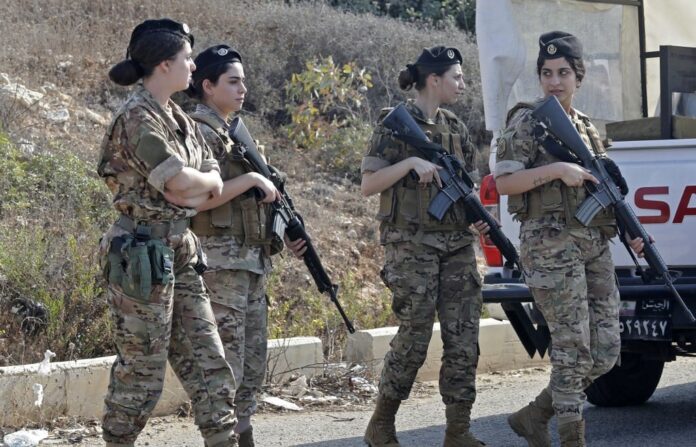LONDON: The Lebanese Army has conducted training to prepare for bank robberies and hostage scenarios following a series of incidents in which depositors stormed banks to demand their frozen savings.
A video of the training, posted earlier this week on the official Lebanese Army Twitter account, shows a group of soldiers recreating a “security incident” at a bank branch.
The purpose of the exercise was to simulate “dealing with a security incident inside a bank and arresting the perpetrators,” the post said.
US and British trainers assisted with the exercise, the army said in the tweet.
The news was confirmed later on Wednesday by authorities. In a statement, officials said: “Units carried out exercises that mimicked arresting terrorists after they forcibly entered a number of banks in the context of a terrorist plot … with the aim of misleading security forces.”
The video shows a group of six soldiers brandishing assault rifles while detaining a man outside a building.
????? ????? ?? ????? ?? ????? ????? ??????? ????? ??????? ?? ??? ???? ???? ??? ??????? ?????? ????????.????? ??? ??????? ?? ???? ??????? ??? ????? ???????? ?????? ??????? ??????? #SOFEX2022 ???? ???? ????????? ?? ??? ????? ??????? ?????????.#?????_???????? #LebaneseArmy pic.twitter.com/LBQpqjRd2h
— ????? ???????? (@LebarmyOfficial) November 8, 2022
The training came as part of the Special Operations Forces Exhibition, a defense industry event held every two years in Jordan.
The video of the training exercise has triggered intense debate among the Lebanese public.
“They are trying to scare the depositors, to make them think twice. The army is not responsible for such things, it’s the police’s job to go inside. The (army) is being given special orders,” Dina Abu Zour, a lawyer from the Depositor’s Union, said.
Lebanese Army spokesperson Georges Khoury said that the training exercises had “no relation to any recent actions in banks.”
He added: “This was just a training activity, training for special forces against any terrorist activity, like kidnappings, for example.”
Over the last few years, Lebanon has experienced a deep economic crisis, with the currency plummeting against the US dollar, causing many people’s savings to plunge in value.
As a result, most Lebanese are unable to access their bank savings due to capital controls.
In recent months, more than a dozen depositors, some of whom were armed, have held up banks, although only a few have faced charges, with authorities avoiding heavy penalties over fears of a widespread backlash.
The government, however, has adopted a harsher tone as the phenomenon of bank raids has continued.

